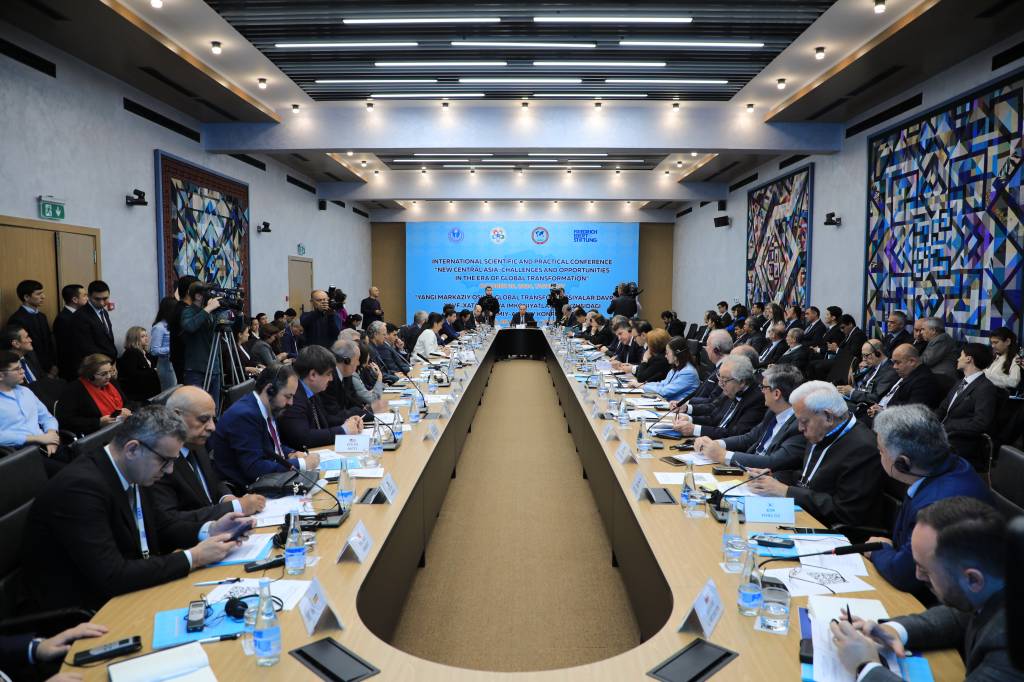
Today, Tashkent is hosting an International Scientific and Practical Conference “New Central Asia: Challenges and Opportunities in the Era of Global Transformation”.
The event is organized by the Institute for Strategic and Regional Studies under the President of the Republic of Uzbekistan in partnership with the International Institute for Central Asia, the University of World Economy and Diplomacy, and the German Friedrich Ebert Foundation.
The conference will be attended by heads and prominent experts from leading analytical centers in Central Asia, the CIS, the EU, China, India, Türkiye, Pakistan, Malaysia, and other countries. In total, more than 40 foreign delegates from 20 countries.
Opening the event, Eldor Aripov, ISRS Director, emphasized that “New Central Asia is a region that in a fairly short period has completely turned the perception of itself in a positive direction”.
According to him, even in the recent past, when discussing the processes taking place in the region, many experts spoke of the “Central Asian Balkans”, of Fergana Valley becoming a “powder keg” where acute territorial and water disputes and interethnic contradictions intersect.
It was noted that our borders were almost wholly closed just seven years ago. We witnessed conflicts and minefields in border areas, transport blockades, and high trade barriers.
The problematic international situation was aggravated by a profound crisis of confidence and the escalation of armed conflicts, which had a direct negative impact on the stability and sustainable development of the region.
Under these conditions, as the expert emphasized, there was a growing public demand for radical changes and solutions to accumulated problems. Deeply aware of this process, the President of Uzbekistan Shavkat Mirziyoyev started to develop a new foreign policy doctrine, where the Central Asian region was defined as the main direction.
The primary task was to find mutually acceptable solutions to all issues based on the principles of openness, pragmatism, constructivism, proactive dialog based on equality, mutual respect, and consideration of interests.
In this context, Eldor Aripov noted with satisfaction that the new regional policy of Uzbekistan has created conditions not only for a radical improvement in interstate relations between Uzbekistan and its neighbors, but has also laid the foundations for further consolidation and integration of Central Asia in a new format.
As a result, he explained, in 2018, on the initiative of Shavkat Mirziyoyev, the mechanism of Consultative Meetings of the Heads of State of Central Asia was launched. “This format became not only a dialogue platform, but also a place for making important political decisions that set the main vectors of interaction between the region’s countries”, convinced the expert.
In particular, he said that significant conceptual documents were adopted over the past six summits, including those of a long-term nature. Thus, in August, the Astana Summit adopted an important document – the Concept for the Development of Regional Cooperation “Central Asia 2040”, which defined the contours of long-term cooperation and confirmed the commitment of the states to make the process of regional collaboration irreversible and progressive.
In other words, as Eldor Aripov is convinced, today, thanks to the political will and joint efforts of the leaders of the region’s countries, we have managed to change the modern image of Central Asia, transforming it into a space of good neighborliness, mutual trust, and cooperation. Our states have created a unique regional model that is resistant to external challenges, demonstrating their readiness to assume responsibility for the common future of the region and ensuring its security and stability.
In addition, the specialist emphasized that today, the region is transforming step by step into a space of new opportunities, convergence of interests, and inclusive cooperation.
Central Asia is a large consumer market with powerful resources, raw material potential, and rich human capital.
In this context, the expert paid special attention to the active dynamics of the region’s economic indicators. The region’s economy has steadily grown (6.2%), twice exceeding the global average (2.6%) in the last ten years. Since 2016, the total regional GDP has increased by 60%, reaching $450 billion by the end of 2023.
At the same time, he pointed out that Central Asia is becoming an essential participant in global economic relations: its foreign trade volume has more than doubled over the past 7 years, reaching about 225 billion dollars. At the same time, intraregional trade has increased 4.5 times (from 2.4 to 11 billion dollars).
“We are moving to a new economic development model based on the complementarity of economies and the competitive advantages of our countries. This, in turn, contributes to the strengthening of industrial cooperation, the creation of a production and technological space, and the transformation of the region into an important link in the international value chain”, Eldor Aripov emphasized.
In his opinion, these circumstances, taken together, increase the interest of extra-regional partners in Central Asia, turning the region into a point of attraction for world powers and leading states. This is also reflected in the created dialogue format “CA Plus”. Today, more than 10 such dialogue platforms are functioning, 6 of which were created in the last 5 years. At the same time, starting in 2022, many of these formats are held at the level of heads of state – with China, the United States, Germany, and the EU. Next year, South Korea will also join the list.
Summing up his speech, Eldor Aripov expressed his firm conviction that the Central Asian countries should take advantage of this unique geopolitical situation to defend a shared vision and agree on regional development priorities in cooperation with third countries.
UzA








